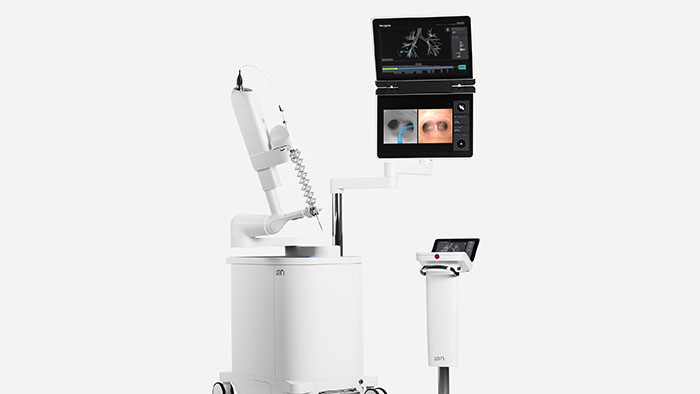Faster Lung Cancer Diagnosis with New Robotic Biopsy System
June 02, 2025
Time matters – especially when you or a loved one is waiting for the results of a lung cancer biopsy.
HSHS St. John’s Hospital is now offering the latest leading-edge technology for lung cancer biopsies with the Ion endoluminal system. The new robotic-assisted procedure can reduce or even eliminate the need for more-invasive lung cancer biopsies or even surgery to determine a cancer diagnosis and subsequent treatment.
The result: A faster diagnosis and treatment plan, which can lead to a better survival rate for patients.
According to the American Cancer Society, 44% of lung cancer cases are not caught until a late stage when the five-year survival rate is only 8%. If the cancer is caught in an early stage, the survival rate jumps to 63%.
“We are proud to make this investment in the latest lung cancer biopsy technology for our patients who are facing the fear of a potential cancer diagnosis,” said Dr. Ashish Tokhi, HSHS Central Illinois Market Chief Medical Officer. “This medical innovation continues our mission of providing the highest quality and compassionate care to those we are privileged to serve.”
The key to the new system is an extremely thin, maneuverable catheter that allows pulmonologists easier and pinpointed access to suspicious nodules in deep lung tissue detected by an initial lung cancer CT scan.
Dr. Manjeshwar B. Prabhu, a pulmonologist at HSHS Medical Group Specialty Clinics in Decatur, Taylorville, Pana, Effingham and Litchfield, said the Ion system outperforms a traditional bronchoscopy because of its access to all 18 segments of the lung.
“The catheter’s ability to move 180 degrees in any direction and maneuver into hard-to-reach areas of the lung during an initial biopsy is a game-changer,” Prabhu said. “This can decrease diagnosis time, allowing me to develop and implement a course of treatment more quickly for a patient if the biopsy indicates cancer.”
Prabhu noted that pulmonologists at the University of Michigan Health-West who analyzed 399 cases using the Ion system from 2020 to 2023 found a diagnostic accuracy of 92%. Additionally, there was a nearly 23% increase in the percentage of early lung cancer diagnoses.
Plus, the technology is less invasive than a traditional bronchoscopy, making the procedure easier on patients.
“Patients experience less discomfort, and recovery time is reduced,” Prabhu said.
Individuals whose lung cancer CT scans have indicated suspicious areas should talk with their doctor about the Ion endoluminal system as the next step in their journey to improved lung health.
HSHS St. John’s Hospital is now offering the latest leading-edge technology for lung cancer biopsies with the Ion endoluminal system. The new robotic-assisted procedure can reduce or even eliminate the need for more-invasive lung cancer biopsies or even surgery to determine a cancer diagnosis and subsequent treatment.
The result: A faster diagnosis and treatment plan, which can lead to a better survival rate for patients.
According to the American Cancer Society, 44% of lung cancer cases are not caught until a late stage when the five-year survival rate is only 8%. If the cancer is caught in an early stage, the survival rate jumps to 63%.
“We are proud to make this investment in the latest lung cancer biopsy technology for our patients who are facing the fear of a potential cancer diagnosis,” said Dr. Ashish Tokhi, HSHS Central Illinois Market Chief Medical Officer. “This medical innovation continues our mission of providing the highest quality and compassionate care to those we are privileged to serve.”
The key to the new system is an extremely thin, maneuverable catheter that allows pulmonologists easier and pinpointed access to suspicious nodules in deep lung tissue detected by an initial lung cancer CT scan.
Dr. Manjeshwar B. Prabhu, a pulmonologist at HSHS Medical Group Specialty Clinics in Decatur, Taylorville, Pana, Effingham and Litchfield, said the Ion system outperforms a traditional bronchoscopy because of its access to all 18 segments of the lung.
“The catheter’s ability to move 180 degrees in any direction and maneuver into hard-to-reach areas of the lung during an initial biopsy is a game-changer,” Prabhu said. “This can decrease diagnosis time, allowing me to develop and implement a course of treatment more quickly for a patient if the biopsy indicates cancer.”
Prabhu noted that pulmonologists at the University of Michigan Health-West who analyzed 399 cases using the Ion system from 2020 to 2023 found a diagnostic accuracy of 92%. Additionally, there was a nearly 23% increase in the percentage of early lung cancer diagnoses.
Plus, the technology is less invasive than a traditional bronchoscopy, making the procedure easier on patients.
“Patients experience less discomfort, and recovery time is reduced,” Prabhu said.
Individuals whose lung cancer CT scans have indicated suspicious areas should talk with their doctor about the Ion endoluminal system as the next step in their journey to improved lung health.

Media Contact
Mary Massingale
System Manager, Communications & Public Relations